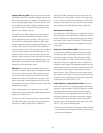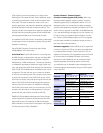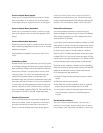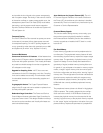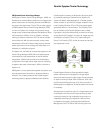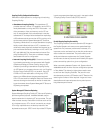
IBM Systems Director Active Energy Manager
IBM Systems Director Active Energy Manager
™
(AEM) is a
building block which enables customers to manage actual
power consumption and resulting thermal loads IBM serv-
ers place in the data center. The z10 EC provides support
for IBM Systems Director Active Energy Manager (AEM)
for Linux on System z for a single view of actual energy
usage across multiple heterogeneous IBM platforms within
the infrastructure. AEM for Linux on System z will allow
tracking of trends for both the z10 EC as well as multiple
server platforms. With this trend analysis, a data center
administrator will have the data to help properly estimate
power inputs and more accurately plan data center con-
solidation or modifi cation projects.
On System z10, the HMC will now provide support for the
Active Energy Manager (AEM) which will display power
consumption/air input temperature as well as exhaust
temperature. AEM will also provide some limited status
confi guration information which might assist in explaining
changes to the power consumption. AEM is exclusive to
System z10.
IBM System z servers stand alone against competition and
have stood the test of time with our business resiliency
solutions. Our coupling solutions with Parallel Sysplex
technology allow for greater scalability and availability.
Parallel Sysplex clustering is designed to bring the power
of parallel processing to business-critical System z10,
System z9, z990 or z890 applications. A Parallel Sysplex
cluster consists of up to 32 z/OS images coupled to one or
more Coupling Facilities (CFs or ICFs) using high-speed
specialized links for communication. The Coupling Facili-
ties, at the heart of the Parallel Sysplex cluster, enable
high speed, read/ write data sharing and resource sharing
among all the z/OS images in a cluster. All images are also
connected to a Sysplex Timer
®
or by implementing the
Server Time Protocol (STP), so that all events can be prop-
erly sequenced in time.
Parallel Sysplex Resource Sharing enables multiple
system resources to be managed as a single logical
resource shared among all of the images. Some examples
of resource sharing include JES2 Checkpoint, GRS “star,”
and Enhanced Catalog Sharing; all of which provide sim-
plifi ed systems management, increased performance and/
or scalability.
Although there is signifi cant value in a single footprint and
multi-footprint environment with resource sharing, those
customers looking for high availability must move on to
a database data sharing confi guration. With the Paral-
lel
Sysplex environment, combined with the Workload
Manager and CICS TS, DB2 or IMS, incoming work can
48
Parallel Sysplex Cluster Technology



